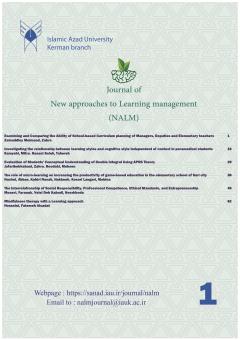بررسی و مقایسه میزان توانمندی برنامه ریزی درسی مدرسه محور مدیران ، معاونان و معلمان مدارس ابتدایی (مطالعه موردی شهرستان بردسیر)
الموضوعات :
1 - دانشیار، گروه علوم تربیتی و روانشناسی، واحد کرمان، دانشگاه آزاد اسلامی، کرمان، ایران
الکلمات المفتاحية: نگرش, مهارت, دانش, مدرسه محوری, برنامه ریزی درسی مدرسه محور,
ملخص المقالة :
مقدمه و هدف: برنامه ریزی درسی عالمانه ضامن تحقق یادگیری موفق فراگیران است. این مقاله با هدف بررسی و مقایسه میزان توانمندی برنامه ریزی درسی مدرسه محور مدیران، معاونان و معلمان مدارس دوره ابتدایی تهیه شده است.بدین منظور چهار متغیر دانش , نگرش ,مهارت و امکانات در سه گروه مخاطب مورد سنجش و بررسی قرار گرفت.
روش شناسی پژوهش: براساس هدف پژوهش روش پژوهش حاضر از نوع مقایسه¬ای بوده است. جامعه آماری این پژوهش کلیه مدیران به تعداد50 نفر، معلمان300نفر و معاونان30 نفر در مقطع ابتدایی شهرستان بردسیر بوده است. بر اساس جدول برآورد حجم نمونه از جامعه مادر حجم نمونه 190 نفر بوده است(25 مدیر،15 معاون و 150 معلم).روش نمونه¬گیری طبقه ایی منظم بوده است.ابزار جمع¬آوری اطلاعات، پرسشنامه« امکان سنجی تحقق برنامه ریزی درسی مدرسه محور» ملکی(1385) می باشد.
یافته¬ها: با استفاده از روشهای آمار توصیفی و استنباطی(آزمون خی دو و ضریب همبستگی پیرسون¬) و با بهره گیری از نرم افزار آماری ۲۱spss یافته¬های پژوهش حاکی از این است که گروه¬های مورد بررسی دارای دانش کافی، نگرش منفی و مهارت ناکافی در زمینه اجرای برنامه ریزی درسی مدرسه محور هستند و مدارس ابتدایی مورد نظراز امکانات مناسب برای اجرای این سنت برخوردارنیستند. همچنین بر اساس مقایسه گروه های مورد بررسی، درخصوص میزان متغیر دانش به ترتیب معلمان، معاونین و مدیران قرار گرفتند. هچنین دو متغیر دانش و امکانات دارای تفاوت معناداری هستند اما در دو متغیر نگرش و مهارت تفاوت معناداری مشاهده نشد.
نتیجه¬گیری: هر چند شاید زمان و شرایط برنامه ریزهای غیرمتمرکز مدرسه محور هنوز فرا نرسیده باشد اما پیشنهاد می شود از طریق تدارک دوره های آموزشی با هدف ارتقا نگرش و مهارت برنامه ریزی درسی دست اندرکاران سیستم اموزشی مدرسه، خصوصاً معلمان به عنوان اصلاح گران حقیقی برنامه های درسی، بهبود اثربخشی برنامه های درسی مدارس محقق گردد.
AdibManesh, M., Ali Asgari, M., & Mosapour, N. (2012). The Feasibility Study of the Implementation of School – Based Curriculum Development in Kermanshah High schools. Journal of Curriculum Research, 1(2), 81-104. https://doi.org/10.22099/jcr.2012.251
Ahmadi, m., salehi, m., Amirianzadeh, M., & Ahmadi, E. (2022). Designing of school-centered model by mixed exploratory research method. Strategic Management Thought, 16(4), 103-136. https://doi.org/10.30497/smt.2023.244015.3440
Chavoshi Hosseini, L., Etemad Ahri, Alaoddin, & Saber Gorkani, Afsaneh. (2023). Presentation of school curriculum model based on social, cultural and psychological needs of secondary school students. ISLAMIC LIFE STYLE CENTERED ON HEALTH, 7(2), 460-473. https://doi.org/https://sid.ir/paper/1134574/en
fariabi, m., kamali, n., & davodi, r. (2021). Designing and explaining the native school-based management model from the perspective of the document of fundamental change in education. Strategic Management Thought, 15(2), 127-164. https://doi.org/10.30497/smt.2022.12886.2789
Fisser, P., & Strijker, A. (2019). Digital Literacy as Part of a New Curriculum for the Netherlands. In Handbook of Research on Media Literacy Research and Applications Across Disciplines (pp. 193-203). IGI Global.
Gholamzadeh, F., Akbari Burang, M., & Ayati, M. (2023). Teachers' perception of values education curriculum in the first year of elementary school. Research in Islamic Education Issues, 30(57), 259-292. https://iej.ihu.ac.ir/article_207712_c1819ec42e7db70737ad3aac969cbeac.pdf
Hemmatyar, M. b., Bahadori, S., & Ashrafi, F. (2020). Investigating the Dimensions of School Independence (School-Centered Idea): Analyzing the Experiences and Opinions of Elementary Schoolsʼ principals. Research in Elementary Education, 1(2), 71-79. https://reek.cfu.ac.ir/article_1095_e463b1f5f373d6ca97687e22593d6e28.pdf
Karami, R., & Nasiri, F. (2019). Investigating the relationship between school-oriented management style and teachers' job success and job adaptability. Journal of School Administration, 8(1), 283-301.
Kazemi, M., Moazami, M., & mohammadi moghadam, y. (2022). Identifying the dimensions and components of the elitism process in elementary schools of Iran country. Educational Development of Judishapur, 13(0), 87-99. https://doi.org/10.22118/edc.2022.357673.2152
Mizrak, S. (2024). Examination of The Relationship Between Teachers’ Occupational Commitment and Job Satisfaction According to Various Variables. Cypriot Journal of Educational Sciences, 19(4), 420-434. https://doi.org/https://doi.org/10.18844/cjes.v19i4.9210
Mousapour, N. (2010). Dos and don'ts in the curriculum planning system of Iran. Publications of Shahid Bahonar Kerman Faculty of Literature and Humanities, 2(2), 20-28.
Piri, M., & Behrozitabar, K. (2016). Feasibility of School-Based Curriculum Development in the Education System from the Standpoint of Educational Experts. Journal of Curriculum Research, 5(2), 1-22. https://doi.org/10.22099/jcr.2016.3833
Rashidi, B., Abedi, A., & Noruozi, G. (2022). Developing the Curriculum Enrichment Model for Gifted and Talented School in Iran: A Grounded Theory Study. Journal of Curriculum Studies, 17(66), 259-288. https://www.jcsicsa.ir/article_150257_ba67f18bcf98aa4ee18ad7491a5f5e6e.pdf
Samadi, P. (2016). Model of school-based curriculum development.
Zeinaddiny Meymand, Z. (2015). Curriculum planning process with emphasis on higher education and university curriculum planning. Publications of Islamic Azad University of Kerman, 1, 280-312.
Zeinaddiny Meymand, Z. (2020). Study the Effectiveness of complementary and extra curriculum activities on students’ self-belief. Biannual Journal of Education Experiences, 3(2), 1-12.
Zeinaddiny Meymand, Z., & Sharifi, P. (2019). The Role of Job Motivation in Faculty Members’ Participation in Curriculum Development. Strides in Development of Medical Education, 16(1).


